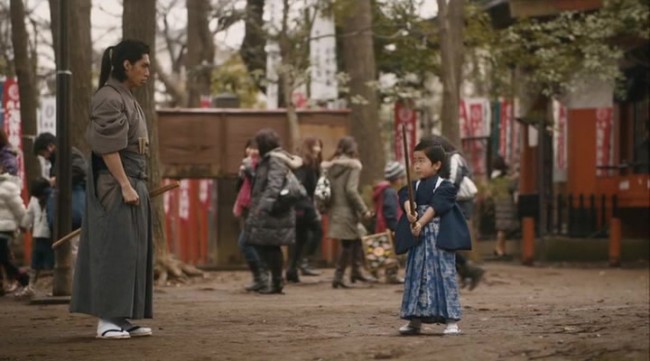A Boy and His Samurai (Chonmage Purin/ちょんまげぷりん) follows a tried-and-true comedic formula: take someone from the past, stick them in the future, and laugh along as he fumbles about. It works in France (Jean Reno in Les Visiteurs), in America (Back To The Future Part II), and with this entrant the New York Asian Film Festival, we can add Japan to the list.
Hiroko Yusa (Rie Tomosaka) is a single mother who is in over her head. The divorcee has to juggle raising her son, Tomoya (the adorable Fuku Suzuki), and work her job. Her habit of coming in late and leaving early is well-known. With all of this energy expended it’s easy to see why she constantly sleeps through her alarm in the morning. Since Tomoya is still growing (at the same rate as her heating bill) it doesn’t look like she’ll be granted a reprieve any time soon. Enter Kijima Yasube (Ryo Nishikido), a samurai from 1826, fully equipped with the standard kimono-and-sword combination, standing on her block one day.
Kijima is brought into the home and, in exchange for room, board, and a quick lesson in modernization, he becomes a stay-at-home dad. An unburdened Hiroko earns herself a raise. Kijima’s samurai discipline lends itself to domestication well. He learns how to do laundry, shop for groceries and with some help from cooking shows, becomes an exceptional chef. That skill lands him in a cooking competition that changes the dynamics of this impromptu family forever.
The film’s title is a bit of a misnomer. One might picture Toshiro Mifune attacking cars in modern day Tokyo like a Japanese Don Quixote as the cute boy teaches him about the ways of our times. Instead, the picture is an examination in gender roles and expectations from a male-dominated past against the new responsibilities that women happily take up. The main conflict is not about the samurai’s ability to stay and learn these new ways or head back to his time. In fact, he takes to our time pretty well. It takes a good forty or so minutes before he sees a telephone as some sort of demon object. It’s a story about whether this old-school warrior can accept a woman as the breadwinner in the household, something that alluded Hiroko’s modern husband.
That’s not to say that this is a feminist film or anything. There is still the expected amount of samurai-related fun. Yes, he adheres to the formal customs in both mannerisms and dialogue. Yes, he teaches the kid how to fight with a sword (and it’s as incredibly adorable as you’d expect). Yes, he keeps this act up in front of strangers who get to wear delightfully confused faces whenever they’re in his company. And yes, he gets to show off his skills with a sword in the arena of battle in a cleverly executed scene.
A Boy and His Samurai felt longer than its 108 minute running time for a variety of reasons. The plot has some slight variations along the way but it mostly keeps to the tropes one would expect from with this subject matter, so not much here will surprise you. A lot of the time is spent waiting for the outsider to fulfill the tropes, as if it’s a contracted obligation. The film’s reliance on static medium-long shots would be an interesting choice if there is something going on within the frame other than a stoic samurai. This leads to the pace feeling off; some sections get the time that should be more evenly distributed amongst the film.
But there’s something to be said about a film doing exactly what it sets out to do and doing it well. It’s an enjoyable little romp that will keep you smiling. And for that, mission accomplished.
A Boy and His Samurai is currently playing at the New York Asian Film Festival.


